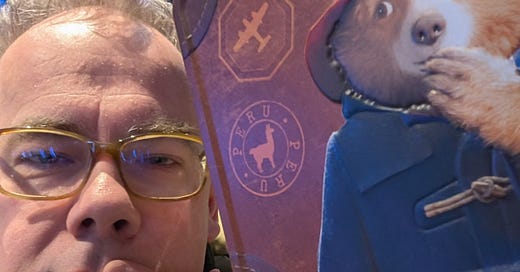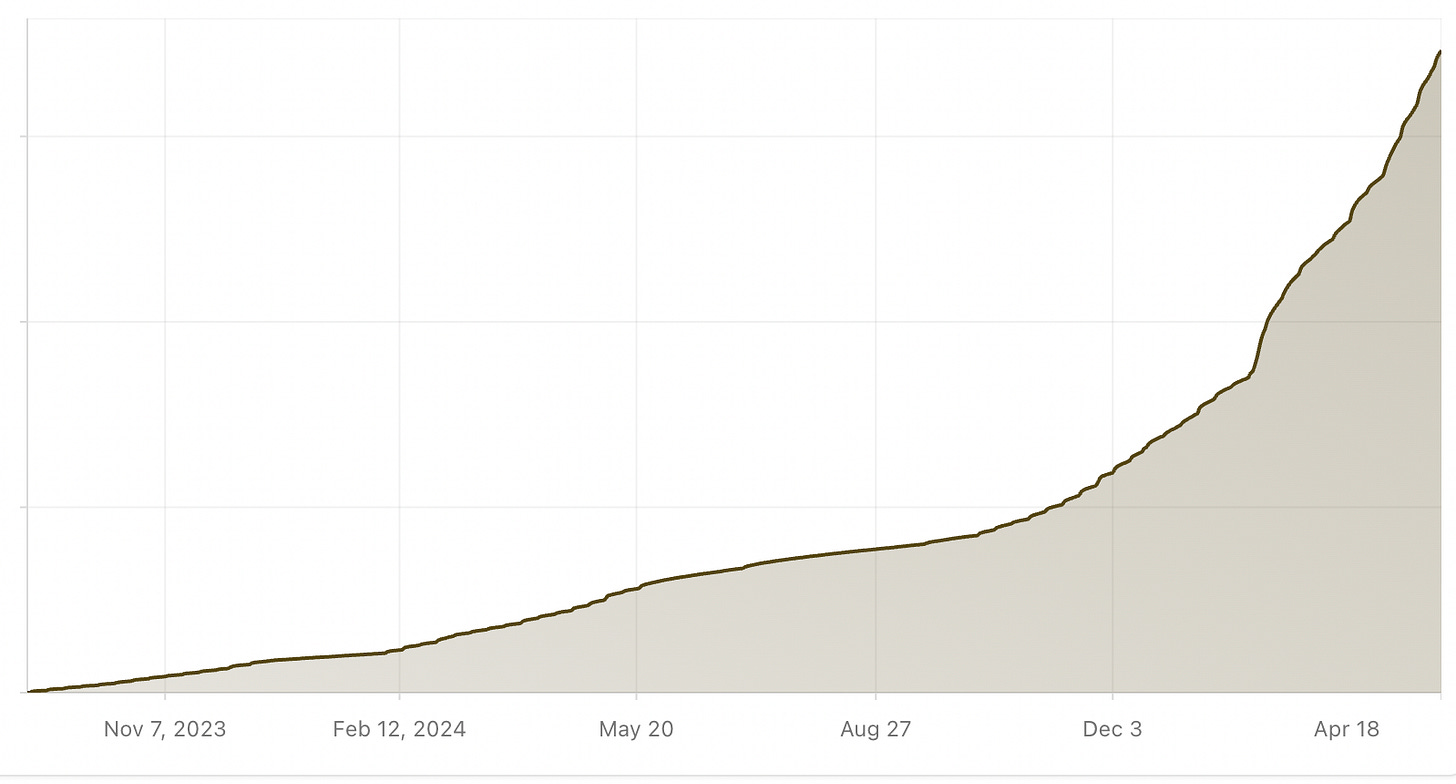Subscriber report: Now we are 3
This newsletter connects a fast-growing network of engaged citizens
1. The citizenship workout
I hit “send” on my first post for this newsletter three years ago today. This is the 361st post. This continues to be a story of rapid growth. Last night I had 39,054 subscribers, paid and unpaid subscriptions combined. That number was 69% higher than a year earlier. Let that amazing growth rate sink in. Paid subscriptions alone are up 30% year-on-year. Last month the download rate for the Paul Wells Show podcast was eight times as high as in the same month a year earlier.
Umbrellas sell when it’s raining. Business picked up when Donald Trump got re-elected, when he threatened tariffs, when Chrystia Freeland quit the Trudeau cabinet, when Justin Trudeau resigned, and when this election campaign began. I have a better chance of keeping pace with events because in January, I hired Suzanne Hancock, my excellent executive producer.
You make this all possible. Thank you so much. Paid subscriptions now cover two salaries, a range of travel and equipment expenses, and occasional freelance articles and photography that I commission. Unpaid subscriptions increase the size of an audience that’s harder every day for newsmakers to ignore.
And increasingly hard to deny.
I keep hearing that what we’re doing here can’t be done. That in an angry time, only angry sells. That audiences have no bandwidth for complexity, nuance or context. That disagreements are for aggravating, and that since we can’t stop polarization, we should push it along.
I don’t claim we’re stopping all of that cold. I’m not peddling rainbows. I often bring the snark. But I’ve never been big on one-explanation-fits-all journalism, so this place has a different feel from a lot of other outlets, more patient and surprising. When we gather here to hear one another out, to give a story more room to breathe than it could get somewhere else, we exercise neglected muscles that can make us better citizens.
So thank you, not only for supporting me, but for showing up. Today I’ll update you on a few items of housekeeping, remind you of this newsletter’s recent highlights, and look ahead.
If somebody forwarded this post to you, consider signing up for a free subscription. About half of my work is always free to everyone.
Or take a paid subscription, at $8 a month or $80 a year, to access all my new writing as well as an archive of more than 300 posts.
You can also give gift subscriptions. Or you can set up group subscriptions. Today for the first time, I’m offering a 15% discount for groups of four or more members.
Finally, a small number of subscribers choose to support me at a higher level through “Next-Level Support,” at up to $250 a year; you can join that tier here.
As always, if you can’t afford a paid subscription, reply to any email you receive from this newsletter and let me know. I’ll give you a gift subscription with full access.
2. Tweaking the product line
The most spectacular growth this year has been in podcast downloads. The Paul Wells Show is becoming part of the weekly current-affairs conversation for thousands of Canadians. See for yourself. I’ll keep some mystery about the Y axis, but:
Half the people who’ve ever downloaded an episode of this podcast via Substack did so in the past 10 weeks. This is a rapid and fundamental transformation.
And yet. Subscribers who cancel have the option of leaving me a note. A few departing subscribers said they think I’ve been concentrating too much on audio and video product. The curve above says they’re outnumbered, but I think they have a point.
Convening The Panel weekly means I’ve doubled my A/V output for the duration of the election campaign. Add occasional live video events when news is breaking, and greater demand for my talking head on TV and radio elsewhere. Too often that limits my writing time.
This will largely self-correct. Once the campaign ends, The Panel will again become an occasional thing. The podcast’s third season will end in June, although I’ll release repeat episodes from the first two seasons through the summer. Given that growth curve, earlier episodes will be new to most of you anyway.
I’ll write more through the spring and summer, and about more topics besides Canadian federal politics. There’s actually a music piece that’s time-sensitive. You’ll see it in the next few days. I’m overdue to travel again for work. When I use cameras and microphones, it will more often be for creative and journalistic uses. And when the podcast returns in the fall, I want the quality of my guests and our conversations to keep driving audience growth. By showing up as you have, you’re telling me it’s worth the work.
3. Past as prologue
Highlights of this newsletter’s last year:
A three-part series on the opioid overdose crisis in Edmonton, the Alberta government’s controversial but ambitious methods for addressing it, and the worries of people who work on the crisis every day.
A long, funny interview with the singer-songwriter Donovan Woods, definitely one of the five most famous Sarnians, unless you count hockey players.
News from my visit to Ukraine, where Volodomyr Zelensky hoped he could still get more help from Joe Biden than he could expect from Donald Trump.
Podcast interviews with Anne Applebaum and Timothy Snyder; with Chantal Hébert, en français; with Jane Philpott; with Musa Al-Gharbi; with Substack co-founder Chris Best; with Branford Marsalis; and with Ira Wells.
And then there was the rolling omnidirectional übercrisis. My reaction to Donald Trump’s re-election, an exercise in applied empathy, was one of the year’s most-read posts. Just before Chrystia Freeland turned on Trudeau, I had a hunch something was up, and wrote a speculative post that looked pretty good a day later. I wrote about America’s long history of coveting the neighbours’ stuff and Trump’s long history of making trouble for tenants.
As the election approached I considered everything I know about Poilievre, first from a largely sympathetic perspective and then more skeptically. As the campaign progresses, I’ve already begun looking ahead to the work that will greet any new government — and the rest of us.
4. Reinforcements
Even for a publication whose total audience grew by an astonishing two-thirds last year, the biggest obstacles are lack of awareness and institutional denial.
The denial comes from newsmakers and their helpers who still think they can ignore me — on their way, too often, to ignoring the Globe, The Line, The Rover, and you. It could not be more obvious as we enter the late 2020s that too many decision makers love gatekeepers and are resourceful in finding ways to hide behind them. My chances of ruining their day improve as my audience grows. We need to become too big to ignore.
Lack of awareness is more innocent but it remains a constant drag for any independent journalist. You’d think everyone who might be interested would know by now what I’m up to. You’d be wrong. You help me every time you mention this newsletter, in ordinary conversation, to your friends and family. When you cite me in your own journalism or academic work, even if only to tear a strip off me. Forward a URL. Recommend a podcast episode to a running companion. Make Twitter suck less, and Bluesky less pollyannish, by putting links to my stuff on those platforms and others.
We are gathering to talk. That’s all we do here, but never doubt its power. Conversation is a fundamental condition of democracy, and even when we are polite about it, it scares the people who think they should be in charge. Thank you for joining this movement, and keep spreading the word.






I used not to be a "podcast" person, because I can consume the written word in a fraction of the time, with less distraction.
But I'm finding that your guests are actually worth LISTENING to. There is this additional rich dimension when hearing their thoughts in their own voices. Moreover, I'm being ENTERTAINED! Comparatively, reading a transcript is work.
So please, keep up the conversations with interesting, topical people.
Every now and again, the universe unfolds as it should and as you hope it will: this is one of those times.